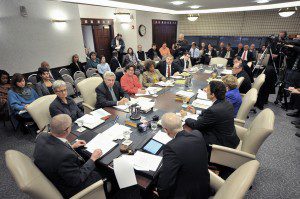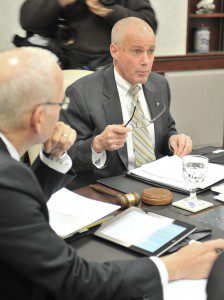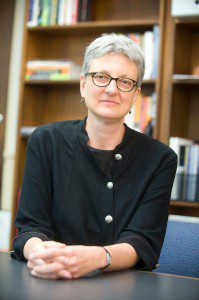
Westfield State University Board of Trustees met in the executive board room yesterday to review a financial report presented by O’Connor & Drew, an auditing firm for the university and to support Elizabeth Preston, vice president of Academic Affairs, as interim president. (Photo by Frederick Gore)
WESTFIELD – The Westfield State University Board of Trustees has unanimously appointed Dr. Elizabeth Hall Preston as interim president of Westfield State University replacing recently resigned president Evan S. Dobelle, effective immediately.
After an executive session that ran close to two hours, the board came to the conclusion that the findings of a spending investigation by Boston-based firm were obviated due to Dobelle’s retirement earlier this month.
“I’ve had the opportunity to work with Dr. Preston since I started (on the board),” said Flynn. “Right now, this university benefits tremendously from Dr. Preston’s experiences here, her understanding and commitment to our university. We clearly need strong leadership at this point, and in my opinion, Dr. Preston is precisely the person to do that.”
“It’s been a difficult semester and year to date, but I think we are making some progress,” said Dr. Preston, speaking of the rebuilding effort of student morale on campus.
The board also heard from David Dilulis of Braintree accounting firm O’Connor and Drew, who conducted an audit of the university’s finances earlier this year. The audit is now the subject of a federal lawsuit that has been filed by Dobelle’s lawyer, Ross Garber.
Dilulis said the audit went “smoothly”, calling it a “huge team effort” between the staff at the school and the university’s Foundation.
“A lot of heads have to be pulled together to get this to the state on time,” he said. “Everything we asked for, management provided.”
Dilulis’ report indicated it had an “unmodified opinion” on the university’s financial statements and a “clean report” on internal control.

Westfield State University Board of Trustee Chairman John F. Flynn III, center, addresses the board prior to yesterday’s closed-door executive session meeting at the university’s administrative building. The board met in executive session to review a financial report on the spending of former university president Evan S. Dobelle, who recently resigned. (Photo by Frederick Gore)
The audit report showed a 2013 statement of net position of $107 million in total assets for the university, a $5 million increase from the year before, according to Dilulis, which he split into two “buckets” with the majority of the school’s assets, cash accounts totaling $42 million and capital assets at $62 million, about 97 percent of the institution’s total assets.
Total liabilities were listed at $34 million for 2013, the majority of which comprised of a bond and compensated absences, making for a difference of about $72 million between assets and liabilities.
Dilulis stated that the institution is doing well, that it has controls in place, and praised the efforts of Lisa Freeman in the school’s accounting department.
“There are three types of comments we can make,” Dilulis said, listing ‘material weakness’, ‘significant deficiencies’, which require the expanding of internal control reports, and ‘management notes.’ The system is working as intended… if we had serious concerns, they would be listed in the report of internal control.”
While Preston declined to address the media following the conclusion of the meeting’s open session, Flynn spoke on the current status of the Board’s legal entanglement with Dr. Dobelle.
“The state oversight agencies, the Attorney General and Inspector General, are handling the investigations,” he said.
Pressed about the Finance Committee’s plans for a new credit card policy, Flynn said that Vice President of Administration and Finance Milton Santiago is “preparing the final drafts, and “we’ll have those here December 12.”
“I think there were a total of 40 and they’ve taken eight… the idea here is to shrink that number down,” he said referencing the number of credit cards that have been issued to university personnel over the last few semesters. “I’m in single digits… low single digits. I think that ‘P-cards’ have a place for purchasing and as a tool within the institution. It’s my understanding that they’re a very limited but useful tool.”
After facing several more questions on the Dobelle saga, Flynn chose to stress the board’s new direction instead.
“This board is looking to move forward,” he said. “We have a new (interim) president. At some point we’ll have to start the search for a new president, but it’s really all about moving beyond… Liz Preston is a true professional and someone I and the institution has a great deal of respect for.”
The search process for a new president was also on everyone’s mind, including Flynn.
“That’s obviously the next chore. That will be a full-time job in and of itself,” said Flynn. “It will be external. It won’t be limited to internal candidates.”
Flynn stated that he has some familiarity with the last search which saw Dobelle get selected from a pool of around 140 candidates, a search that was “very inclusive” and involved students, faculty, and support staff.
“We have a little bit of work to do here before we go jumping into a search process,” he said. “I think we need to let the current Interim President Preston get settled. I would like to see some of these investigations get closed up and put behind us, and be able to talk with candidates without a lot of this stuff happening.”
“It will take a little bit of time. I think Interim President Preston will be here maybe a year, I’m guessing.” Flynn said. “These presidential searches all align somehow with the academic year, because people are in jobs. They don’t want to leave them, and we’re halfway through a year right now. So there are those complications that make it more challenging than it would otherwise be.”
“The responsibility of this board is to find a president that is going to take the university where it’s going to go next,” he said. “We were very happy at the time with (our last) appointment, things occurred over a five year period that were very good. But at the end we ended up finding ourselves in a situation that resulted in resignation and we moved on.”
“We need to probably take a personal inventory, figure out who we’re looking for, where do we go next, who do we become,” he said. “I think that’s all become part of the process. College president searches are a bit more comprehensive than your standard presidential searches. This is a very inclusive community. It needs to be for everyone to feel comfortable that we’ve got the right person.”
“It’s going to take us awhile but we’ll get there. We’ll be happy,” he said.


